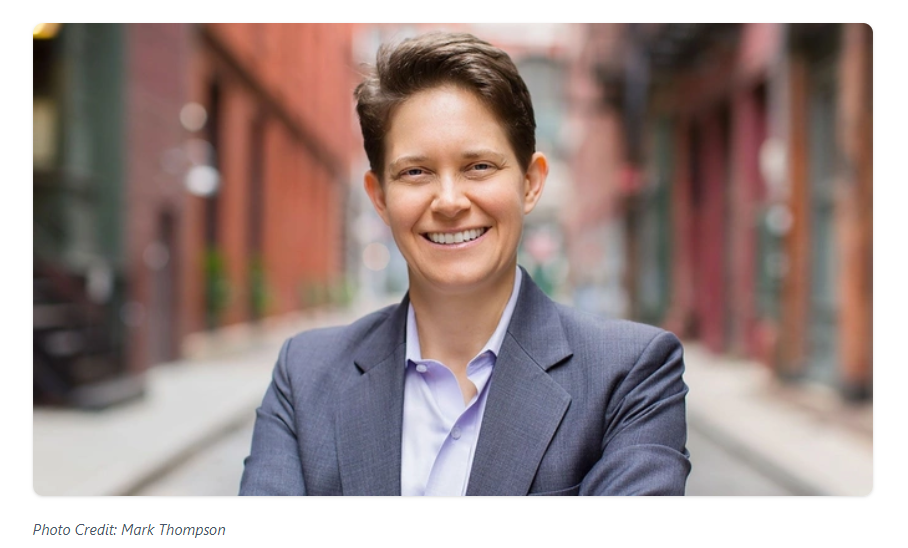In this week’s episode Dorie Clark, Wall Street Journal bestseller and renowned business coach is here to guide you through a series of short-term decisions that will have lasting impact.

When I first launched my business I accepted a gig running Facebook ads, it paid $250 per month. Now, keep in mind that I used to work at Facebook so I should have been charging way more.
Here’s where it gets even more interesting. Within a few months I turned down a similar opportunity that paid $20,000 per month.
At this point you must be wondering why I made that decision. The answer is simple, I read a really good book, Reinventing You: Define Your Brand, Imagine Your Future. It’s written by Dorie Clark and thanks to her guidance I was able to make the right decisions for my business and my family.
It took me a while but I was eventually able to find other opportunities that eventually led to me making over $20,000 a month, and I was able to do so on my own terms. I played the long game and it paid off.
What does this mean to you? By learning how to leverage strategic patience and build a powerful network you can also experience sustainable success and growth for your business. Fortunately, Dorie will show you exactly how to do so in her latest book, The Long Game: How to Be a Long-Term Thinker in a Short-Term World. She’ll also teach you how to keep moving forward, even when you’re faced with adversity.
Dorie sat down to talk with me about it during the latest episode of the Launch Your Business podcast.
Here are a few of my favorite takeaways.
Grow your business by “thinking in waves”
Your first wave of customers will most likely come from your personal and professional network. That’s a great place to start since these people already know, like and trust you.
As you start to gain traction your next wave typically comes from your own sales efforts. By this time you have more credibility and will feel more comfortable talking to strangers about how you can help them. This will work, but don’t get stuck here, especially if you want to scale.
As Dorie mentions “If you’re going to have a successful business doing sales all the time becomes a problem. And the reason for that is that sales often is not incredibly scalable. If you want to grow exponentially, rather than just incrementally, you need marketing in order to expose yourself and your business to a new audience.”
She then provides an approach for you to consider as you’re just starting out, and once you begin to grow. “As we’re thinking in waves early on, you over-index on sales, but eventually you need to level up your marketing as well, so that you can grow your business for the long term.”
Action item: Determine how you can turn your initial wave of customers into a marketing asset. This includes testimonials, referrals and case studies.
Why making time for white space is your competitive advantage
Dorie referenced a survey of executives that blew my mind. Ninety-seven percent of respondents stated strategic thinking was responsible for the majority of their success, but only four percent said they block off time for it.
Fortunately, that’s good news for you. As Dorie explains “If we’re talking about a growth edge for you and your business; actually carving out time and getting good at strategic thinking and long-term thinking is one of the very best investments you can make in your business.”
This could be as simple as blocking off – and protecting – a few hours a week to think about your business. Through this intentional white space you’re able to ponder and discover what actions you should start, stop or continue to grow your business and become more fulfilled.
Action item: Block off thirty minutes for strategic thinking this week. Determine exactly where you’ll do it and put it on your calendar.
Leveraging strategic patience to grow your business
Overnight success is rare and often short-lived. To grow a sustainable business Dorie recommends leveraging strategic patience.
Here’s an example from my career so you can wrap your head around it. Years ago I was asked to speak at an Amazon event here in New York City. I didn’t get paid for it but I kept in contact with the organizer and found additional opportunities to provide value. Fast forward to this year, I delivered a keynote at Amazon’s headquarters in Seattle. That same organizer recommended me and yes, I got paid for it.
Clark explains “Strategic patience is placing little bets and monitoring them. It’s not like you just sit back and let life come to you. You place a bet. You put your money down, you see what happens and then you adjust a new pivot as necessary.”
She continues “I think that’s really what we need is patience with an understanding that it’s going to take awhile, but I’m going to watch this thing and I’m going to make sure that it’s heading in the direction that I want.”
The part about making sure things are going in the right direction is crucial. Although my partnership with Amazon went well, I can share numerous examples of high-potential opportunities that completely flopped.
The key is to place bets so big that if they work out, there’s a huge benefit for you and your business. And if they aren’t going so well, know when to practice strategic quitting as opposed to strategic patience.
Action item: Think of one big bet you could make on the future of your business. Examples include proposing a partnership, starting a new service or joining a relevant community.
What’s next?
Those were a few key takeaways from my conversation with Dorie. To hear the full conversation and get access to additional resources tune in to this week’s episode of the Launch Your Business podcast.
This article was written by Terry Rice, and originally appeared on Entrepreneur.com.




